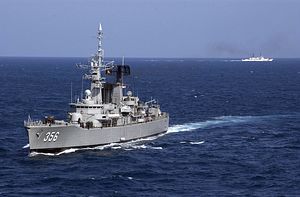This week, Indonesia and Vietnam held the third round of their bilateral cooperation committee meeting in Hanoi. Though the meeting saw both sides discuss a range of issues, the headlines were centered around the security domain in general and the maritime realm in particular.
As I have noted before, Indonesia-Vietnam relations have developed over the years, from a comprehensive partnership agreement signed in 2003 to a strategic partnership in 2013, the two countries have also looked to make progress in the maritime realm as well.
Last year for instance, which was an active year for defense ties, saw both sides ink a letter of intent for cooperation between their coast guards, work on ways to better manage challenges such as managing their maritime boundaries and the treatment of fishermen amid some recent clashes, and discuss to the South China Sea issue, where Vietnam is a claimant and Indonesia is an interested party (See: “China-Vietnam South China Sea Spat in the Spotlight”).
On April 17, the two countries held the third iteration of the Vietnam-Indonesia Bilateral Cooperation Committee in Hanoi, led by Indonesian Foreign Minister Retno Marsudi and Vietnamese Foreign Minister Pham Binh Minh. During the meeting, both sides reviewed their existing collaboration, discussed regional and international issues, and also looked at areas where cooperation could be furthered such as trade and food security.
Unsurprisingly, the headlines around the interaction were focused on the maritime domain. In particular, attention was paid to the fact that the two sides agreed to establish a coordination mechanism for the protection of fishermen and fishing vessels and countering maritime crimes.
That both sides are working to manage issues on this front is neither new nor surprising. It has been a contentious matter for the two countries over the past few years, especially as the Indonesian government under President Joko “Jokowi” Widodo continues its tough campaign against illegal fishing and its hardened stance on preserving the country’s maritime sovereignty (See: “Indonesia’s Maritime Ambition: Can Jokowi Realize It?”). And there is not really a simple solution to the challenge itself, since there are various aspects to it ranging from the boundaries themselves to the policing of waters to the education of fishermen.
So it was not surprising that while both foreign ministers made references to aspects of the challenge and spoke about ways to address them generally, they did not offer much in the way of specifics. Irrespective of whatever mechanisms both sides adopt, the true challenge will come on fronts such as enforcement, coordination, and resourcing.
The South China Sea issue also got a mention in the official readout of the meeting, with both sides necessarily mentioning the respect for international law and regional mechanisms. In reality, as I have been noting, even as the two countries continue to restate this rhetoric, they are also undertaking their own measures to safeguard their interests unilaterally as well as in concert with other states as they continue to confront an assertive China in the maritime domain (See: “Will an ASEAN-China South China Sea Code of Conduct Really Matter?”).
































